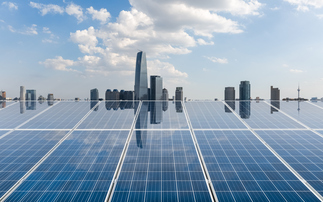Development bank expects to lend €100bn for climate adaptation and mitigation between 2015 and 2020
The European Investment Bank (EIB) is to lend around €100bn to climate change-related projects during the next five years and will step up investment in flood protection and other adaptation projects.
The bank this week unveiled its new climate strategy, promising to lend at least 25 per cent of all its new loans to climate-related investments, equivalent to around €19bn per year.
The new policy marks a shift from the previous strategy, which set a target of reaching 25 per cent - now it hopes to exceed that goal.
Speaking to reporters in London yesterday, Jonathan Taylor, EIB vice president of Environment and Climate Action, said the commitment would result in a total of €53bn of climate finance being mobilised between 2015 and 2017, growing to around €100bn by the end of the decade, assuming the current trajectory continues.
The commitment comes ahead of this week's International Monetary Fund and World Bank Group annual meeting in Lima, Peru, which will look at the challenges of scaling up climate finance globally. It also comes after the United Nations last month agreed a set of 17 Sustainable Development Goals, which the EIB is expected to support.
In addition, with the world racing towards a major climate change summit in Paris in September, rich countries are stepping up their climate finance pledges in a bid to help poor and vulnerable countries cope with the worst impacts of climate change. They have set a target to provide $100bn of climate finance a year to poor countries by 2020.
However, with the vast majority of EIB's climate lending helping European countries, only around €2.3bn of its €19bn annual climate lending is expected to contribute to the UN target, said Taylor. But he added that over the coming years, the EIB did expect to increase overseas lending, for example to small island states that are struggling with rising sea levels and more frequent and extreme weather patterns.
Taylor said the new strategy will also seek to even out the share of investment between climate mitigation and adaptation, such as flood protection and planting more forests. Last year, just two per cent of the EIB's €19.1bn climate finance supported adaptation projects, but Taylor said there was a growing recognition from countries around the world of the need to invest more in measures to cope with floods, storms and rising sea levels.
"There is a demand out there for adaptation... it is quite clear that some countries are already suffering from the impacts of climate change and will continue to do so, so even if we keep below the two degree [target] the point is that measures need to be made now to help them to adapt to those things," he said, adding that flood management would be a particular focus.
The bank is also seeking to increase investments in energy efficiency projects, which last year accounted for €2.3bn of its lending, compared to €5.9bn on renewables.
"We want to focus more on impact," he said. "There are various reasons why energy efficiency is always more challenging, and one of those is that most energy efficiency projects are quite small so you need to find ways of aggregating them and bringing recipients together and you need to find financing vehicles. We do want to do more of that."
Another strand of the new strategy seeks to mainstream climate measures into projects that would not traditionally have that focus. Even though 75 per cent of its lending will remain outside the "climate" strategy, Taylor said the bank would seek to encourage more of these projects to also include low carbon measures, for example fitting solar panels on school roofs.
In the last three years, the UK has been the biggest country recipient of EIB climate lending, borrowing around €11bn of the total €60bn lent. Taylor said he saw a healthy pipeline of green projects in the UK over the coming years, despite growing concerns from investors over the UK's renewable energy policies. Last month, the UK first the first time dropped out of the top 10 in the influential Renewable Energy Country Attractiveness Index, following the government's controversial plans to slash a host of clean energy subsidy schemes.
"We've almost got more business than we can cope with so that's very good," he said. "Now if investors are saying other things - some of them will be looking at them from particular areas that they're investing in... but we're looking across the [climate] piece as a whole rather than any particular sector."










